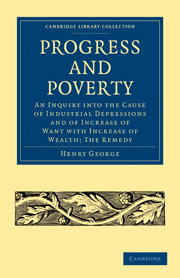 Progress and Poverty
Progress and Poverty Book contents
- Frontmatter
- PREFACE TO FOURTH EDITION
- Contents
- INTRODUCTORY
- BOOK I WAGES AND CAPITAL
- BOOK II POPULATION AND SUBSISTENCE
- BOOK III THE LAWS OF DISTRIBUTION
- BOOK IV EFFECT OF MATERIAL PROGRESS UPON THE DISTRIBUTION OF WEALTH
- BOOK V THE PROBLEM SOLVED
- BOOK VI THE REMEDY
- Chapter I Insufficiency of remedies currently advocated
- Chapter II The true remedy
- BOOK VII JUSTICE OF THE REMEDY
- BOOK VIII APPLICATION OF THE REMEDY
- BOOK IX EFFECTS OF THE REMEDY
- BOOK X THE LAW OF HUMAN PROGRESS
- CONCLUSION
- INDEX
Chapter I - Insufficiency of remedies currently advocated
Published online by Cambridge University Press: 07 September 2011
- Frontmatter
- PREFACE TO FOURTH EDITION
- Contents
- INTRODUCTORY
- BOOK I WAGES AND CAPITAL
- BOOK II POPULATION AND SUBSISTENCE
- BOOK III THE LAWS OF DISTRIBUTION
- BOOK IV EFFECT OF MATERIAL PROGRESS UPON THE DISTRIBUTION OF WEALTH
- BOOK V THE PROBLEM SOLVED
- BOOK VI THE REMEDY
- Chapter I Insufficiency of remedies currently advocated
- Chapter II The true remedy
- BOOK VII JUSTICE OF THE REMEDY
- BOOK VIII APPLICATION OF THE REMEDY
- BOOK IX EFFECTS OF THE REMEDY
- BOOK X THE LAW OF HUMAN PROGRESS
- CONCLUSION
- INDEX
Summary
In tracing to its source the cause of increasing poverty amid advancing wealth, we have discovered the remedy; but before passing to that branch of our subject it will be well to review the tendencies or remedies which are currently relied on or advocated. The remedy to which our conclusions point is at once radical and simple—so radical that, on the one side, it will not be fairly considered so long as any faith remains in the efficacy of less caustic measures; so simple that, on the other side, its real efficacy and comprehensiveness are likely to be overlooked, until the effect of more elaborate measures is estimated.
The tendencies and measures which current literature and discussions show to be more or less relied on or advocated as calculated to relieve poverty and distress among the masses, may be divided into six classes. I do not mean that there are so many distinct parties or schools of thought, but merely that for the purpose of our inquiry, prevailing opinions and proposed measures may be so grouped for review. Remedies which for the sake of greater convenience and clearness we shall consider separately are often combined in thought.
There are many persons who still retain a comfortable belief that material progress will ultimately extirpate poverty, and there are many who look to prudential restraint upon the increase of population as the most efficacious means, but the fallacy of these views has already been sufficiently shown.
- Type
- Chapter
- Information
- Progress and PovertyAn Inquiry into the Cause of Industrial Depressions and of Increase of Want with Increase of Wealth; The Remedy, pp. 269 - 294Publisher: Cambridge University PressPrint publication year: 2009First published in: 1881


